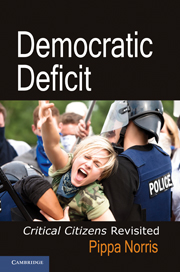Book contents
- Frontmatter
- Contents
- List of Tables
- List of Figures
- Preface and Acknowledgments
- PART I INTRODUCTION
- PART II SYMPTOMS
- PART III DIAGNOSIS
- 7 Rising Aspirations?
- 8 Democratic Knowledge
- 9 Negative News
- 10 Failing Performance?
- PART IV PROGNOSIS
- 12 Conclusions and Implications
- Technical Appendix A Concepts and Measures
- Technical Appendix B Countries in the Pooled World Values Survey, 1981–2007
- Technical Appendix C Methods
- Notes
- Selected Bibliography
- Index
9 - Negative News
Published online by Cambridge University Press: 05 June 2012
- Frontmatter
- Contents
- List of Tables
- List of Figures
- Preface and Acknowledgments
- PART I INTRODUCTION
- PART II SYMPTOMS
- PART III DIAGNOSIS
- 7 Rising Aspirations?
- 8 Democratic Knowledge
- 9 Negative News
- 10 Failing Performance?
- PART IV PROGNOSIS
- 12 Conclusions and Implications
- Technical Appendix A Concepts and Measures
- Technical Appendix B Countries in the Pooled World Values Survey, 1981–2007
- Technical Appendix C Methods
- Notes
- Selected Bibliography
- Index
Summary
One of the most popular explanations for any growth in public disaffection is based upon theories of political communications. Two alternative versions of this thesis can be distinguished in the literature. The first, arising from the theory of ‘video-malaise,’ focuses upon the type of media. This perspective argues that television broadcasting in general and the accumulated effects arising from the standard tone of TV news reporting in particular usually foster public mistrust of government and dissatisfaction with regime institutions, thus contributing toward civic disengagement. A related argument shares similar concerns but it emphasizes the tone of media coverage, particularly the impact of watchdog journalism when covering scandals, malfeasance, and corruption in public life, irrespective of which media convey such news. A steady diet of negative news is thought to encourage a rising tide of political disenchantment.
Although plausible and popular claims, the evidence supporting each of these arguments remains scattered and inconclusive. The concept of ‘negative’ news is far more complex in practice than is often assumed in popular commentary; for instance, studies have found that Americans distinguish between critical coverage of issues and ‘mud-slinging’ personal attacks. Any impact from negative news may also prove highly contingent upon attitudinal predispositions; research suggests that the effects arising from strategic campaign news coverage and from negative campaign advertising in the United States are mediated by citizens' prior levels of political sophistication, partisanship, and involvement, as well as by their media habits and by the broader political climate.
- Type
- Chapter
- Information
- Democratic DeficitCritical Citizens Revisited, pp. 169 - 187Publisher: Cambridge University PressPrint publication year: 2011



